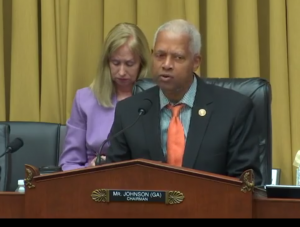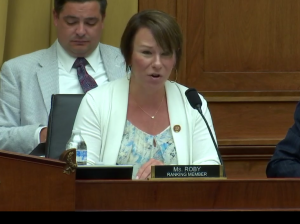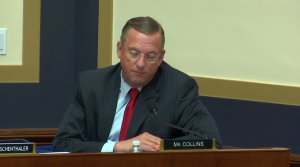“Between 2013 and 2017, there was a 1200% increase in filings from China and the fees for a large number of trademarks that have been identified as fraudulent were paid for by only three credit cards.”

Rep. Hank Johnson (D-GA)
At a hearing of the House Judiciary Committee’s Subcommittee on Courts, Intellectual Property, and the Internet this morning, titled Counterfeits and Cluttering: Emerging Threats to the Integrity of the Trademark System and the Impact on American Consumers and Businesses, members of Congress expressed concern over the steep rise in trademark applications by Chinese filers, many of which have been found to be fraudulent. The problem has been exacerbated by poor enforcement on the part of platforms like Amazon, eBay, and Walmart; by the limited authority of the U.S. Patent and Trademark Office (USPTO) to revoke registrations once issued; and by incentives offered by the Chinese government in the form of subsidies to Chinese applicants for U.S. trademarks, said panelists.
The Scale of the Problem
Mary Boney Denison, Commissioner for Trademarks at the USPTO, was the sole witness on the first panel; she told the Subcommittee members that the USPTO is aggressively tackling the problem of inaccurate trademark filings via examiner training, a new requirement for foreign applicants to use U.S. attorneys, and better technology solutions for identifying fraudulent specimens, among other efforts. Subcommittee members including Representatives Lou Correa (D-CA) and Ted Lieu (D-CA) and Subcommittee Chair Hank Johnson (D-GA) repeatedly asked Boney Denison for recommendations on what additional statutory powers the Office would like to have to help combat the problem. She declined to provide specific suggestions but said the Office has been brainstorming with congressional staff on the topic.

Mary Boney Denison
Some witnesses who spoke after Boney Denison suggested that allowing the USPTO to revoke registrations found to be fraudulent after they have been issued would be helpful. Presently, the Office can only stop registration up to the time of issuance; once a registration has been granted the USPTO relies on third parties to challenge registrations via cancellation or opposition proceedings. Jeanne Fromer, Professor of Law, New York University School of Law, explained that the cost of a trademark opposition ranges from $95,000 to $500,000 according to two studies on the topic. “Many small businesses will throw up their hands and give up,” Fromer said. “The USPTO should have authority to take more initiative to audit crowded parts of the register.”
According to Boney Denison, between 2013 and 2017, there was a 1200% increase in filings from China and the fees for a large number of trademarks that have been identified as fraudulent were paid for by only three credit cards. “Did that not set off alarm bells?” asked Representative Martha Roby (R-AL). Boney Denison said it did, and that the Office is taking it seriously. For instance, a Task Force has been formed to identify problems as they come in going forward.
The Platforms Stay Home

Rep. Martha Roby (R-AL)
Many witnesses and representatives felt that the platforms on which these fraudulently registered brands are eventually being sold are not doing enough. Roby said that 20 of 47 phone chargers purchased by the Government Accountability Office from third-party sellers on popular e-commerce websites were counterfeit. “Some were so defective they posed a significant risk of catching fire or electrocuting consumers,” Roby said.
Representative Doug Collins (R-GA), rather than questioning Boney Denison, took his time to call out Amazon, eBay and Walmart for not being present.
“I know that Amazon, eBay and Walmart are listening. We cannot hide from this discussion. I need them to be part of these discussions at the table. The way you solve problems is not by avoidance but by actually taking the issues on. We’re trying to make this better for you and the customer.”

Rep. Doug Collins (R-GA)
Collins added that during a recent roundtable discussion on brand owners and platforms, he heard that Chinese headquartered e-commerce site Alibaba is doing the most to curb counterfeit products by employing cutting-edge technology to scan for and detect counterfeits and by working closely with brand owners. “I find it shocking that U.S. counterparts are so far behind,” Collins said. Later, Joseph Cammiso, President, Automotive Anti-Counterfeiting Council, Inc., who showed disturbing video of what can happen when consumers mistakenly purchase counterfeit parts, said that most platforms mandate rights holder participation, which requires time and resources. “It’s very cumbersome and I don’t think solutions are scalable to the extent they need to be,” he said.
China’s Push for U.S. Trademarks
China is also actively incentivizing Chinese citizens to file for U.S. trademarks via substantial subsidies that have led to the creation of “filing factories,” said Boney Denison. In response to an edict of China’s Central Committee about protecting intellectual property, regional and local governments began subsidizing fees for Chinese filers of U.S. trademarks, which has led to large-scale filings. Boney Denison also said that she has heard that China’s college entrance examination now has IP questions on it, underscoring the importance of IP to the Chinese government. “It’s considered very prestigious in China to say you have a U.S. trademark registration,” Boney Denison said she has heard anecdotally.
The USPTO receives approximately 400,000 trademark applications per year, with about 60,000 of those originating from China. About half of those received a refusal or request for more information, said Boney Denison. In FY17 the Office issued about 20,000 registrations to Chinese applicants and in FY18 about 38,000. “Hopefully, most were legitimate,” Boney Denison said.
While some of the applications coming in are clearly for legitimate businesses, the USPTO has scaled up its efforts to identify which ones contain fraudulent specimens of use via new examination guidance, an instruction to examiners that they must issue a refusal on suspicious applications by default, rather than simply asking for more information first, and working to compile a database of specimens of use, which currently doesn’t exist.
eBay Haunts Trademarks, Too

Peter Brody
Peter Brody of Ropes & Gray, LLP and the International Trademark Association, who spoke on the second panel, pointed to a failure of the courts to help curb the problems as well. Brody advocated for legislation that would restore the rebuttable presumption of irreparable harm warranting injunctive relief in trademark cases, which has been gradually eroded since eBay v. MercExchange in 2006. “The kinds of harm trademark infringement causes cannot be remedied with damages alone.,” Brody said. He called the courts’ extension of eBay to trademark law “deeply flawed.” “The Patent Act provides for guaranteed monetary remedy in form of a reasonable royalty, and patent infringement does not cause the unquantifiable harm to goodwill or reputation that the Lanham Act is intended to address,” Brody said.
The Subcommittee members asked Boney Denison to provide them with regular updates from the newly formed Task Force that will be monitoring fraudulent filings in order to determine next steps.

![[IPWatchdog Logo]](https://ipwatchdog.com/wp-content/themes/IPWatchdog%20-%202023/assets/images/temp/logo-small@2x.png)

![[Advertisement]](https://ipwatchdog.com/wp-content/uploads/2024/04/Patent-Litigation-Masters-2024-sidebar-early-bird-ends-Apr-21-last-chance-700x500-1.jpg)

![[Advertisement]](https://ipwatchdog.com/wp-content/uploads/2021/12/WEBINAR-336-x-280-px.png)
![[Advertisement]](https://ipwatchdog.com/wp-content/uploads/2021/12/2021-Patent-Practice-on-Demand-recorded-Feb-2021-336-x-280.jpg)
![[Advertisement]](https://ipwatchdog.com/wp-content/uploads/2021/12/Ad-4-The-Invent-Patent-System™.png)







Join the Discussion
9 comments so far.
modestoschweizer
September 26, 2019 02:32 pmJust go towards the File tab, drag and drop it to preferred timeline. Resolution:To resolve the above mentioned error messages and overcome the risks created after storage device corruption, a great way is to format the storage device inside camera. Ever since business became digital, there is literally no turning back.
lowellostermann
September 18, 2019 10:28 amAt the identical time, the price of the product remains to be accepted and inexpensive with just a little increase. What excellent news for the soccer mania.
elishaleachman
September 10, 2019 02:51 pm“(To date) we have saved about 300,000 k – Wh,” said, Dr. Don’t’ forget to click on the Slide Show and Video to your left. Seven lease sales that were scheduled to take place after Obama’s inauguration have been now canceled entirely: one in the western Gulf, one off the coast of Virginia, and five in Alaskan waters, all with proven reserves.
DIma
September 4, 2019 01:08 am@George D. Morgan
https://www.onscope.com/ipowner/en/owner/profile/4200795-xiamen-youjing-e-commerce-co-ltd.html – 683 Trademark Applications, only July, from one company
@Benny
We were several times in China and explained to Factory owners that they can not sell that product into US/Europe (IP) as we did the “shop tour”. Big factories have Pattern Attorneys which are Pros in reading Pattern applications and they can give clear instruction what needs to be changed to get a unique product. Seen many cases where Product A equals Product B , but the court decided against the Rights Owner….
Anon
July 21, 2019 08:00 amBenny,
I think that you omitted a key word in Pro Say’s mantra: American innovation.
Benny
July 21, 2019 02:55 amPro say,
First, selling counterfeit phone chargers is not a war on innovation by any means, but you would do well to steer clear of such “bargains”.
Second, before claiming that China is engaged in a war on innovation, you have to accept the fact that the Chinese tech industry is, in fact, innovative.
George D. Morgan
July 19, 2019 02:15 pmFrom what I can see, many Chinese trademark filers are trying to obtain U.S. trademarks to get onto Amazon’s brand registry. They are, in fact, selling to U.S. consumers and are trying to protect their brands. They are not abusing the system.
Anon
July 19, 2019 09:45 amThere is a tangent left unexplored here in that India recently held a judgement against platforms with holding them partially responsible for the traffic of goods through their platforms.
Pro Say
July 18, 2019 09:09 pmChina has launched a full scale war on American innovation.
A war which has actually been raging “under the radar” for a few years now.
For the good of our Country, eBay — like Alice and Mayo — must be specifically abrogated.
The innovation cancer that is eBay — like Alice and Mayo — must be quickly excised from the IP landscape before any more damage is inflicted on us all; on all companies big and small.
Congress, the August recess is now just weeks away.
Where are you?
America needs you … now.